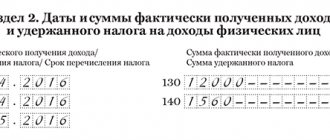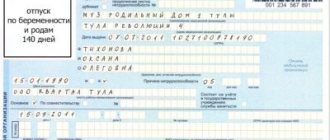An employee of an enterprise can get sick at any time - during work and during vacation, and each time he is paid differently. Calculations of payments for temporary disability are always calculated on an individual basis, depending on the average salary, the time of sick leave, the number of sick days in the current billing period, the type of sick leave, and so on. Let's find out by what rules sick leave is issued and paid during vacation followed by dismissal.
What are the features of sick leave during vacation followed by dismissal?
Sick leave during vacation followed by dismissal is not a typical situation, and therefore it differs in some features associated with the following points:
- the date of issue of the order to dismiss the employee;
- the employee’s right to leave;
- carrying out the transfer of dismissal;
- the procedure for calculating payments to a dismissed employee.
The head of the company must simultaneously issue 2 orders in relation to one of his subordinates:
- order to grant the employee leave (form No. T-6);
- order to dismiss an employee (Form No. T-8).
The date of dismissal of the employee and the last day of his vacation should not coincide.
If an employee is fired for violating the labor discipline of the enterprise, he does not have the right to leave, after which he could have been fired. If there is a certificate of incapacity for work, then leaving work will be dated on the first working day after leaving sick leave.
If an employee takes sick leave when the manager has already issued a dismissal order, the dates relating to leave and dismissal should not be changed.
If an employee loses his job immediately after he goes on vacation, the money he earned and his work record must be transferred immediately, without waiting for the end of the vacation.
Vacation followed by dismissal is provided at the discretion of the employer - the law does not oblige to satisfy the employee’s request.
There is also the opposite situation, when an employee managed to rest, taking advantage of part and full period of annual leave, but did not work these days - then leave not only cannot be granted, but overpaid vacation pay is also withheld from the employee’s salary in the amount of no more than 20% of the amount. salary
Reasons for termination of an employment contract
When applying for a job, a new employee enters into an agreement with the organization, which is regulated by the provisions of the Labor Code of the Russian Federation. Termination of this agreement may occur for various reasons:
- at the request of the employee;
- at the initiative of the employer;
- by agreement of both parties;
- due to circumstances beyond the control of both parties;
- when moving to a new position;
- in case of violation of the rules of the employment contract;
- upon expiration of the contract.
The most convenient option for both parties is mutual consent. In this case, the employee and manager can enter into an agreement that will be beneficial to both. Usually, in this case, the employee receives additional payments, and the employer guarantees that the agreement will not be canceled or challenged due to changed circumstances in the employee’s life.
Dismissal for inadequacy of the position is a rare option, as it is often difficult to prove.
An employee who does not show up for work may subsequently bring sick leave, in which case he will not be counted as absenteeism. Professional unsuitability can only be revealed in the event of a general certification that meets the requirements of the law.
Expert opinion
Lebedev Sergey Fedorovich
Practitioner lawyer with 7 years of experience. Specialization: civil law. Extensive experience in defense in court.
The most common is leaving work of your own free will. Sometimes, even in the case of serious violations, the employer gives the person the opportunity to write a statement on his own so that dismissal under the article is not recorded in the work book.
But more often a person simply finds another, higher-paying, prestigious or convenient vacancy or moves.
Sometimes the reason for dismissal is reluctance to work under new management, unpreparedness for business trips, changes in working conditions, or deteriorating health.
After the written application, a two-week work period follows , but often people try to reduce it or avoid it altogether. Since sick leave is included in service upon dismissal, sometimes it is taken so as not to return to the place of duty. But before making hasty decisions, you need to know how many days you are supposed to work in different situations.
https://youtu.be/d9KY6ZSVXO0
An example of how sick leave is issued during vacation followed by dismissal
Let's imagine the situation. Secretary Petrov I.I. submits an application for annual leave and dismissal of her own free will immediately after the rest. The manager agrees, the personnel service employees and the accounting department draw up documents according to which the due funds (last salary and vacation pay) will be paid on the last working day - October 29, 2016. After the dismissal was completed, Petrova issued a sick leave, in which the date of onset of the illness is November 21. 2016, and the closing day for sick leave is December 6, 2017.
When registering sick leave during the vacation period, the dismissal documents are not subject to change. The leave, although it is the main one, is not extended due to the period of incapacity for work, since the subordinate is fired.
Since Petrova managed to bring sick leave within the first month after the date of dismissal, she should be compensated for it. The post-dismissal benefit is paid in the amount of 60% of average earnings for the last 2 years, regardless of the length of insurance coverage. An employee cannot receive 2 payments at the same time, since sick leave is paid from November 29, 2016 - from the date of dismissal.
Vacation may be issued to an employee who resigns immediately upon its completion, and the dismissal order must be dated from the final day of vacation. Thus, the last day of work is not the day of dismissal, but the penultimate day of vacation.
Vacation cannot be extended due to sick leave. Petrova’s vacation was paid for from November 1, 2016 to November 28, 2016. From November 29, 2016, she began to receive money for sick leave for 3 days – November 29, 30 and 31, 2016. This money will be transferred from the employer's funds. Further, all sick days are compensated from the Social Insurance Fund budget in the amount of 60% of average earnings.
Application for extension of leave
Annual paid leave must be extended or postponed to another period determined by the employer taking into account the wishes of the employee, in the event of temporary disability of the employee (according to Article 124 of the Labor Code of the Russian Federation).
| Situation: According to the vacation schedule, an employee is entitled to a vacation of 10 days. He went on vacation, but a day later he fell ill and was on sick leave for 7 days. This means that the employee either leaves vacation 7 days later than originally expected, or leaves on time, but still has 7 days of vacation left. An employee can go to work exactly when, according to the order for granting leave, his leave should have ended. In this case, the working time sheet will contain the code “OT” (annual leave) not for 10 days, but only for 3 days. And in 7 days - code “B” (temporary disability). During these days he will receive disability benefits. |
The period for which the vacation will be postponed (the remaining part of the vacation) is determined by the employer, taking into account the wishes of the employee expressed in the application (Part 1 of Article 124 of the Labor Code of the Russian Federation). Accordingly, the employer is obliged to postpone the vacation at the request of the employee.
But the transfer date is determined not only based on the wishes of the employee, but also taking into account the capabilities of the employer. After the employee and employer agree on the date of the new vacation, it is necessary to issue an order to postpone the vacation. And based on the order, make changes to the vacation schedule.
| Important! What should an accountant do with vacation pay? For example, in the situation discussed above, vacation pay was paid for 10 days, but in fact 3 days of vacation were used. Is it possible to deduct vacation pay from an employee for unused vacation days? Article 137 of the Labor Code clearly states cases when certain amounts can be withheld from an employee’s salary. This list is exhaustive and is not subject to broad interpretation. The current situation is not on this list. This means that vacation pay for 7 days cannot be withheld from the employee. |
Despite the fact that the mechanism for such recalculation is not specified directly in the Labor Code of the Russian Federation, it is necessary to do so. After all, vacation pay accruing during the period of vacation actually not used due to illness is, in fact, no longer the average earnings saved for vacation days.
For the days that the employee was ill, his lost earnings are compensated by paying temporary disability benefits. In practice, they do this: accountants recalculate and spend vacation pay for sick days as an advance to the employee towards his salary, which he will begin to earn after returning from vacation.
And such actions are legal, the prohibition of the Labor Code of the Russian Federation on withholding is observed - no amounts are withheld from the employee. When the employee goes on vacation, it will be necessary to issue a new vacation order and accrue vacation pay to him again, calculating the average earnings.
We suggest you read: How to extend maternity leave without losing your place
| Important! But if an employee is delayed in returning to work for exactly the same number of days as the sick leave was issued for, it means that he decided to extend his vacation. And he should not write any applications to extend his vacation. There is no need to draw up an order to extend vacation or make changes to the vacation schedule. The only document that the employee must provide and which obliges the employer to extend the leave is a certificate of temporary incapacity for work. In such a situation, there is no need to recalculate vacation pay. The employee must be paid sickness benefits (Clause 1, Article 15 of Law No. 255-FZ of December 29, 2006). |
| Situation: In practice, employees determine the date of return from vacation in case of illness independently, counting the number of days of incapacity from the last day of vacation. However, the number of sick days and the number of vacation days that an employee has taken is not always the same. For example, if a non-working holiday falls during the period of illness, there is no need to extend vacation for it - it no longer falls within the vacation period, but is excluded from it along with days of illness (Part 1 of Article 120 of the Labor Code of the Russian Federation). Or the number of sick days may be greater than the number of vacation days not used because of it. Vacation is extended specifically for vacation days not used due to illness, and not for sick days. |
If an employee falls ill before the start of the vacation and does not have time to recover by the time it begins, the vacation must be rescheduled for another date.
When a person, during an annual paid vacation, was forced to take a sick leave (certificate of incapacity for work), the days indicated on the sick leave are deducted from the period provided. He gets the opportunity to use legal days off for rest. However, there are a number of nuances that must be taken into account.
Official leave is postponed or extended by the number of days that are documented by the medical institution. If such a situation occurs, the registration of a repeated vacation period is carried out in a separate procedure.
This means that free days that the employee did not have time to use are canceled and transferred to a period that is agreed upon by both parties. A person cannot independently make a decision about continuing rest after leaving treatment.
To carry out the above actions, it is important to correctly prepare the necessary documentation. Extension or transfer of vacation is carried out only on the basis of primary paper - an order to provide a vacation period for a certain term.
Once agreement is reached on this issue, the director prepares a new order, which specifies new dates for future rest. The listed statements and orders are written according to a standard template, which the company’s HR department employees are always ready to provide.
The organization has a five-day work week, Saturday and Sunday are days off. The employee was on leave from March 23 to May 30, 2020. While on vacation, she fell ill and issued a certificate of incapacity for work from May 4 to June 6.
In the case under consideration, the certificate of incapacity for work was issued for the period from May 4 to June 6, i.e. for 34 days. At the same time, 27 days of temporary disability coincided with vacation days, and one of the days fell on the non-working holiday of May 9 - Victory Day (see part one of Article 112 of the Labor Code of the Russian Federation).
However, the number of extended vacation days includes another non-working holiday - June 12 - Russia Day (see part one of Article 112 of the Labor Code of the Russian Federation). As we mentioned above, by virtue of Art. 120 of the Labor Code of the Russian Federation, this day is not included in the number of calendar days of vacation, therefore the end of vacation due to this holiday should be shifted by another 1 day.
As a result, the employee’s vacation will end on June 26, 2020. Thus, the first option for determining the employee’s return to work day is correct - the employee must begin his work duties on June 27, 2020.
How is sick leave processed during vacation followed by dismissal?
Vacation followed by dismissal is issued to the employee on the basis of a submitted resignation letter of his own free will.
An employee of the HR department is engaged in processing the dismissal of this employee - you can generate documents in two ways:
- in the form of a free-form order granting leave with subsequent dismissal to the employee;
- in the form of two orders - in form No. T-6 on the provision of rest time, in form No. T-8 on dismissal.
Next, the accounting department receives orders to calculate payments to the dismissed employee - dismissal pay (salary, bonus, allowances, additional payments, increasing coefficients) and vacation pay.
The HR department employee completes the dismissal procedure by making an entry about the dismissal in the work book and closing the employee’s personal card.
Date of termination of employment
The Labor Code describes in detail the procedure for dismissing an employee, the rights and obligations of the parties, and the legal grounds for their implementation. A lot of time can pass from the date of filing the application to the actual date of dismissal of the employee, so clear regulation of the period is of great importance.
The employer needs to find a replacement specialist without loss of productivity, but keeping a former employee longer than expected is unacceptable.
In case of voluntary dismissal, the period of service will be standard two weeks. If layoffs are planned due to the liquidation of the organization, management is obliged to warn workers 2 months in advance.
The disease makes adjustments to the schedule of activities. You will have to resign after sick leave. What number to apply for reduction depends on two factors:
- the newsletter ends on a working day;
- the end of the sheet fell on a holiday or day off.
In the first case, the procedure is performed according to the standard scheme. The conditions of the second option allow you to dismiss the employee on the next working day.
How is sick leave paid during vacation followed by dismissal?
It doesn’t matter for what reason an employee is fired, sick leave must be compensated in any case.
The actions of an employee who wishes to receive payment for a certificate of incapacity for work are as follows:
- bring the head of the enterprise a sick leave certificate (issued within a month after dismissal, no later) within six months from the date of dismissal;
- demand payment of benefits for sick leave issued due to illness, poisoning, injury to the employee himself, as well as the need to care for a sick family member (not if the sick leave was issued after dismissal);
- demand sick leave benefits calculated according to the minimum wage (7,800 rubles from July 1, 2020), if there is no data on average earnings for the past 2 years.
Common mistakes
Error: An employee demands an extension of his main leave with subsequent dismissal for the period of time that he spent on sick leave.
Comment: In general, annual leave should be extended by the number of days indicated on the sick leave issued during the rest period. But not in the case of vacation followed by dismissal - in such a situation the vacation is not extended.
Error: An employee is going to complain to the Labor Inspectorate about an employer who refused to provide him with leave followed by dismissal.
Comment: Providing leave, after which the employee immediately leaves work, is not the responsibility of the employer, so he is guided by the current state of affairs at the enterprise.
Answers to common questions about sick leave during vacation followed by dismissal
Question No. 1: Will I be paid for sick leave if I took it out during my main vacation followed by dismissal?
Answer: Yes, a certificate of incapacity for work provided to the employer within a month from the date of dismissal is subject to compensation in the amount of 60% of the average income for the 2 years preceding the insured event.
Question No. 2: I was fired for repeated violations of labor discipline, can I request leave with subsequent dismissal?
Answer: No, in such a situation the employee is not entitled to leave.
Rate the quality of the article. Your opinion is important to us:








